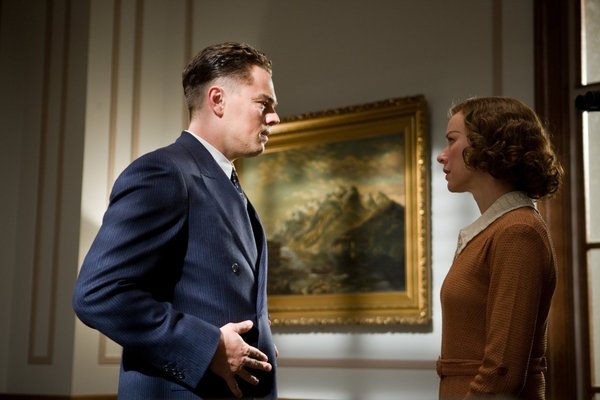Reviewed by GREG KING
Director: Clint Eastwood
Stars: Leonardo Di Caprio, Armie Hammer, Judi Dench, Naomi Watts, Ken Howard, Jeffrey Donovan.
For nearly fifty years, J Edgar Hoover was the most powerful man in American law enforcement. Not only did he establish the FBI and its well respected forensics laboratories and impressive data bases, but he was also a power hungry, paranoid and ambitious man who gathered secret files on the sex lives of everyone prominent in public life. For Hoover, secrets and information represented power, and he used those files to blackmail those he saw as potential enemies or threats to his position. He was not above even blackmailing Attorney General Robert Kennedy to ensure his position. But he also had a darker secret private life that may have brought about his downfall if exposed, especially in an era when homosexual relationships were frowned upon and powerful men remained firmly in the closet.
Hollywood has yet to produce the definitive biopic on the legendary head of the FBI, and despite high hopes, Clint Eastwood’s fascinating but flawed J Edgar is not it. The prolific Eastwood is an interesting filmmaker who chooses vastly different material for his films, and while J Edgar is good it is not great.
Written by Oscar winner Dustin Lance Black (Milk, etc), this is an impeccably researched and ambitious warts-and-all biopic about Hoover. Hoover was guarded about his private life, but Black is drawn to the more salacious rumours concerning his homosexuality. The film looks at his long and intimate friendship with his assistant Clyde Tolson (Armie Hammer, from The Social Network, etc), although Eastwood tends to shy away from overtly depicting his homosexuality. Black seems to suggest that Hoover was driven by his repressed homosexuality to protect America from enemies both within and abroad.
The film begins with an elderly Hoover dictating his memoirs, and we see events unfold through a lengthy series of flashbacks. This is a classic structure for a biopic, but it reinforces the belief that Hoover himself is an unreliable narrator, and it also gives the material something of a disjointed structure. The film spans some fifty years, covering the turbulent history of America in the twentieth century, from the famous gangsters of the 30s, the Lindbergh kidnapping, and through to the Kennedy assassination and the civil rights movement of the 60s. However, the tone of the film overall is a little ambiguous, and it is not clear whether Black and Eastwood set out to demonise Hoover or portray him as some sort of 20th century hero and extol his achievements.
Hoover has been portrayed on screen before, most memorably by Broderick Crawford in Larry Cohen’s little seen muck raking The Private Files Of J Edgar Hoover, who brought a suitable bluster to the character and captured his darker side.
Leonardo Di Caprio would not have been many people’s obvious choice to portray the legendary J Edgar Hoover, but he does a good job getting a handle on this enigmatic, complex character. This is a rounded, subtle, and persuasive performance that captures his paranoia, his buttoned-down personality and his self-loathing. He is heavily made up with prosthetics to resemble the pudgy, aging lawman, but he also vaguely resembles Phillip Seymour Hoffman, who may have been a good choice for the role. Di Caprio has matured as an actor over the past decade, choosing solid and challenging roles and working with good directors who push him to deliver solid performances.
Eastwood has assembled a solid supporting cast. Judi Dench is good as his formidable and somewhat domineering mother who wanted to raise a son rather than a daffodil (a somewhat polite term of the era to describe effeminate men.) “I would rather have a dead son than a daffodil,” she tells him bluntly. Although she suspected her son’s rather effeminate nature she helped him find a way to deal with his social awkwardness and avoid public scrutiny. Naomi Watts is solid as Helen Gandy, his loyal and trusted private secretary and guardian of his secrets. Hammer is strong as Tolson, but unfortunately, his make-up as the older Tolson is somewhat offputting and too heavy. He comes across as something of a caricatured figure from a horror movie.
As usual Eastwood has drawn upon his regular team of collaborators to recreate 1930’s Washington. James J Murakami’s production design is excellent and reeks of authenticity, while Deborah Hopper’s costumes also reflect the era. Regular cinematographer Tom Stern has shot the film primarily in desaturated colours, which further adds to the authenticity. Eastwood has also incorporated some archival footage to add further authenticity to the material.
★★☆




